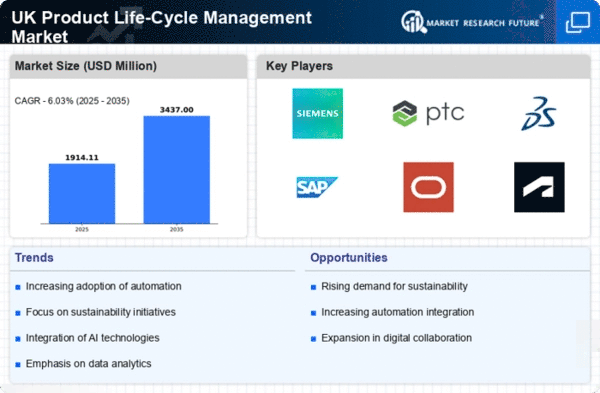Rising Demand for Customization
The product life-cycle-management market is experiencing a notable shift towards customization, driven by consumer preferences for tailored products. As businesses strive to meet these demands, they are increasingly adopting PLM solutions that facilitate rapid design changes and product variations. In the UK, the market for customized products is projected to grow at a CAGR of 8.5% over the next five years. This trend compels companies to invest in PLM systems that enhance flexibility and responsiveness, thereby improving their competitive edge. The ability to efficiently manage product data and streamline workflows is crucial in this context, as it allows organizations to deliver personalized offerings while maintaining quality and compliance. Consequently, the rising demand for customization is a significant driver of growth in the product life-cycle-management market.
Increased Focus on Data Analytics
The integration of data analytics into product life-cycle-management processes is transforming how organizations operate in the UK. Companies are increasingly utilizing analytics to gain insights into product performance, customer preferences, and market trends. This shift is driving the demand for advanced PLM solutions that incorporate analytics capabilities. The product life-cycle-management market is projected to grow as businesses recognize the value of data-driven decision-making. By leveraging analytics, organizations can optimize product development cycles, reduce time-to-market, and enhance overall efficiency. The potential for improved product quality and customer satisfaction further underscores the importance of data analytics as a key driver in the product life-cycle-management market.
Regulatory Compliance and Standards
In the UK, stringent regulatory requirements across various industries are compelling organizations to adopt robust product life-cycle-management systems. Compliance with regulations such as REACH and RoHS necessitates meticulous tracking of product materials and processes. The product life-cycle-management market is thus witnessing increased investment in solutions that ensure adherence to these standards. Companies are leveraging PLM tools to manage documentation, traceability, and reporting, which are essential for meeting legal obligations. The market for compliance-related PLM solutions is expected to expand, as businesses recognize the importance of mitigating risks associated with non-compliance. This driver highlights the critical role of regulatory frameworks in shaping the product life-cycle-management market, as organizations seek to avoid penalties and enhance their reputation.
Emphasis on Cost Reduction Strategies
Cost efficiency remains a primary concern for organizations operating in the product life-cycle-management market. In the UK, businesses are increasingly focused on strategies that minimize costs while maximizing product value. This has led to a growing interest in PLM solutions that streamline processes and reduce waste. Companies are leveraging these systems to identify inefficiencies and implement best practices throughout the product life cycle. The potential for significant cost savings is a compelling driver for investment in PLM technologies. As organizations seek to enhance profitability, the emphasis on cost reduction strategies is likely to continue shaping the product life-cycle-management market.
Growing Importance of Collaboration Tools
Collaboration among cross-functional teams is becoming increasingly vital in the product life-cycle-management market. As organizations in the UK strive for innovation and efficiency, they are adopting PLM solutions that facilitate seamless communication and collaboration. These tools enable teams to work together more effectively, regardless of geographical location. The market for collaborative PLM solutions is expected to expand as businesses recognize the benefits of enhanced teamwork in product development. By fostering collaboration, organizations can accelerate decision-making processes and improve product outcomes. This trend indicates a shift towards integrated approaches in the product life-cycle-management market, where collaboration tools play a crucial role in driving success.
















